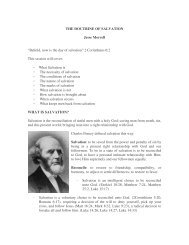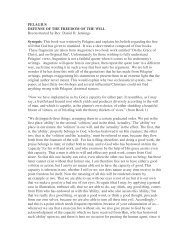Does_God_Take_Away_Free_Will_Jesse_Morrell 2.pdf - PinPoint ...
Does_God_Take_Away_Free_Will_Jesse_Morrell 2.pdf - PinPoint ...
Does_God_Take_Away_Free_Will_Jesse_Morrell 2.pdf - PinPoint ...
Create successful ePaper yourself
Turn your PDF publications into a flip-book with our unique Google optimized e-Paper software.
10; 1 Pet. 1:22; Rev. 22:17). Christ died for our disobedience to<br />
<strong>God</strong>’s moral law, not because we couldn’t obey, or because <strong>God</strong>’s<br />
laws are impossible, but because we didn’t obey <strong>God</strong>. Because we<br />
were deliberate criminals, not defective cripples. We need the<br />
atonement to atone for our personal choices to disobey <strong>God</strong>’s<br />
moral law (Isa. 52:3; 53:6).<br />
The wrath of <strong>God</strong> is impartial (Ex. 32:33; Deut. 10:17;<br />
Rom. 2:9; 2 Cor. 10:6; Col. 3:25; 2 Pet. 1:17; 1 Jn. 3:15; Rev.<br />
21:8; 22:15), anyone who consciously sins, rebels, revolts, or<br />
transgresses is under condemnation (Jn. 3:19; Rom. 1:18; 2:6-11;<br />
Heb. 10:26-31; 1 Jn. 3:8; 3:15; 3:20; 2 Jn. 1:9). <strong>God</strong> is against<br />
those who deliberately sin every day (Isa. 52:5; Hos 13:2; 2 Pet.<br />
2:14). The punishment of <strong>God</strong> is rightly and justly executed upon<br />
willful, voluntary, deliberate rebellion (1 Sam. 3:13; Prov. 1:24-26;<br />
Isa. 1:20; 64:5, 7; Jer. 4:4, 17-18; 5:6; 6:10-11, 19; Eze. 20:21;<br />
Hos. 9:9; Zech. 7:11-13; Matt. 22:27; Lk. 10:27; Jn. 3:19; Acts<br />
3:23; Rom. 2:5, 14-16; Heb 10:26-31; Eph. 5:6; 2 Thes. 1:8; 1 Pet.<br />
4:17). Sin and guilt are not hereditary because <strong>God</strong>’s justice does<br />
not allow children to be punished for the sins of their parents<br />
(Deut. 24:16; 2 Kin. 14:6; 2 Chro. 25:4; Jer. 31:29-30; Eze. 18:2-4;<br />
18:19-20). Infants are morally innocent (2 Kin. 21:16; 24:4; Matt.<br />
18:3) and have not yet “done anything” morally “good or evil”<br />
(Rom. 9:11) until the age of accountability, which is the age of<br />
reason, when they know right from wrong (Deut. 1:39; Isa. 7:15-<br />
16), and choose to do what they know is wrong (Jas. 4:17). Each<br />
man originates their own sin, each man is the author of their own<br />
moral character (Ecc. 7:29; Matt. 12:34-35, 15:19; Mk. 7:21-22;<br />
Lk. 6:45). Sin is not transmitted, transferred, inherited, inherent,<br />
innate, inbred, or inborn. Sin is not propagated through hereditary<br />
imputation (Deut. 24:16; 2 Kin. 14:6; 2 Chro. 25:4; Jer. 31:29-30;<br />
Eze. 18:2-4; 18:19-20), but sin is propagated through personal<br />
imitation (1 Kin. 14:16; 15:26, 30, 34; 16:13, 26; 21:22; 22:52; 2<br />
Kin. 3:3; 10:29, 31; 13:2; 14:24; 15:9, 18, 24, 28; 21:11, 16; 23:15,<br />
Neh. 13:26; Jer. 32:35; Isa. 3:12; Hos. 6:7; Matt. 18:6; Mk. 9:42;<br />
Lk. 17:2; Rom. 5:12; 5:14; 5:19; 1 Cor. 8:9; Heb. 4:11) Men<br />
choose to sin like Adam (Hos. 6:7). Men choose to join Adam’s<br />
rebellion (Rom. 5:12, 14, 19). Men are dead in sins, that is, they<br />
are separated from <strong>God</strong>, having a dead relationship, because they<br />
have each voluntarily and personally chosen to sin (Isa. 59:2; Lk.<br />
15:24; Rom. 5:12; 5:14; 7:9; 7:11; Col. 2:13). Men make<br />
themselves sinners (Gen. 6:12; Exo. 32:7; Deut. 9:12; 32:5; 1 Sam.<br />
3:13; Jdg. 2:19; Isa. 66:3; Hos. 9:9; Ps. 14:2-3; Isa. 53:6; Ecc. 7:29;<br />
Zep. 3:7; Matt. 12:34-35; 15:17-20; Mk. 7:15, 21-22; Lk. 6:45;<br />
Rom. 3:23). Men originate their own moral character (Ecc. 7:29;<br />
Matt. 12:34-35; 15:17-20; Mk. 7:15, 21-22; Lk. 6:45). Men are<br />
responsible for their own condemnation (Eze. 14:14; Hos. 13:9;<br />
Rom. 2:5; 2:27; Gal. 6:17-8; Heb. 2:2; 2 Pet. 2:13). Sinners are<br />
accountable for their own sin (Deut. 24:16; 2 Kin. 14:6; 2 Chro.<br />
25:4; Eze. 18:2-4; 18:19-20; Matt. 16:27; 2 Cor. 5:10; 11:15; 1 Pet.<br />
1:17; Rev. 22:12). While moral depravity is not hereditary (Deut.<br />
24:16; 2 Kin. 14:6; 2 Chro. 25:4; Eze. 18:2-4; 18:19-20; Jer. 31:29-<br />
30), physical depravity is hereditary (Gen. 1:21; 1 Cor. 15:21-22,<br />
38-39; Heb. 2:14). But metaphysical constitutions have no moral<br />
character in and of themselves, apart from their use by the will or<br />
heart of man (Matt. 15:17-20; Mk. 7:15; Rom. 6:13, 6:19).<br />
Involuntary lusts of the flesh are temptations but not sin (Gen. 3:6;<br />
Heb. 4:15; Jas. 1:14), they become sin if the will submits to them<br />
(Matt. 5:28; Jas. 1:15), if men choose to selfishly serve themselves<br />
(Rom. 8:13; 9:5-8; 2 Pet. 2:10).<br />
Under <strong>God</strong>’s Government there are morally loyal subjects<br />
(Rom. 15:18; 2 Cor. 2:9; 1 Pet. 1:14; 1 Jn. 3:22; 4:17) and morally<br />
rebellious subjects (Isa. 14:13-14; 30:9; 30:15-16; 31:6; 42:24;<br />
Neh. 9:29; Lk. 19:14; 19:27). Loyal subjects are those who obey<br />
the moral law (Jn. 14:15; 1 Jn. 2:3; 1 Jn. 3:22; Rev. 12:17; Rev.<br />
14:12), who allow <strong>God</strong> to govern their moral actions. Rebels are<br />
those who reject the law of <strong>God</strong> (Rom. 10:21; 1 Tim. 1:9; 1 Jn.<br />
3:4), who resist the reigning of <strong>God</strong> over their moral actions (1<br />
Sam. 8:7; Lk. 19:14), who “despise” the Lord’s “government” and<br />
are “self-willed” (2 Pet. 2:10). Christians are those who were<br />
formerly disobedient (Tit. 3:3; 1 Pet. 3:20) but are no longer<br />
disobedient (Rom. 6:17; Php. 2:12; Eph. 6:6; 1 Jn. 3:9; 3:22).<br />
Christians make the daily choice to obey <strong>God</strong> (Lk. 9:23; 1 Cor.<br />
15:31). But sinners are unwilling to being governed by <strong>God</strong> (Isa.<br />
14:13-14; 30:9; 30:15-16; 31:6; 42:24; Neh. 9:29; Lk.19:14;<br />
19:27), they want to govern their own lives (2 Pet. 2:10). Sinners<br />
are unwilling to seek after <strong>God</strong> (Isa. 30:9; 30:15; 30:16; Matt.<br />
11:20-21; 23:37; Mk. 6:6; 7:30; 13:34; 14:17-18; 19:14; 19:27; Jn.<br />
5:40; Rev. 2:21), though <strong>God</strong> is not far from anyone (Acts 17:27).<br />
All men are under moral obligation in <strong>God</strong>’s Moral<br />
Government, under obligation to the moral law of love (Matt.


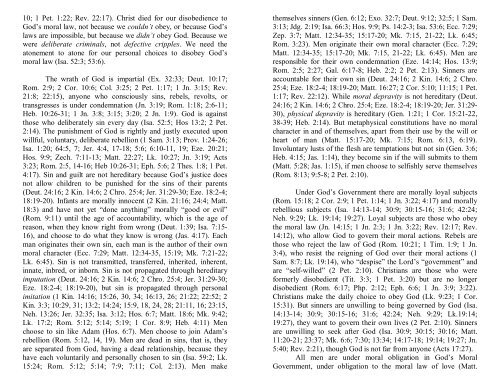

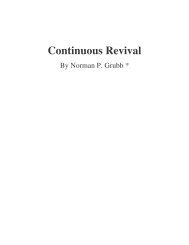
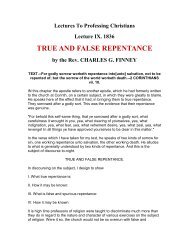
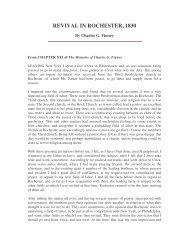

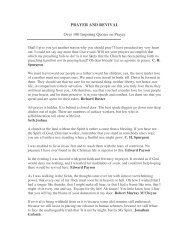
![[PDF] SIX DAYS OR MILLIONS OF YEARS? - Answers in Genesis](https://img.yumpu.com/34887318/1/190x245/pdf-six-days-or-millions-of-years-answers-in-genesis.jpg?quality=85)




